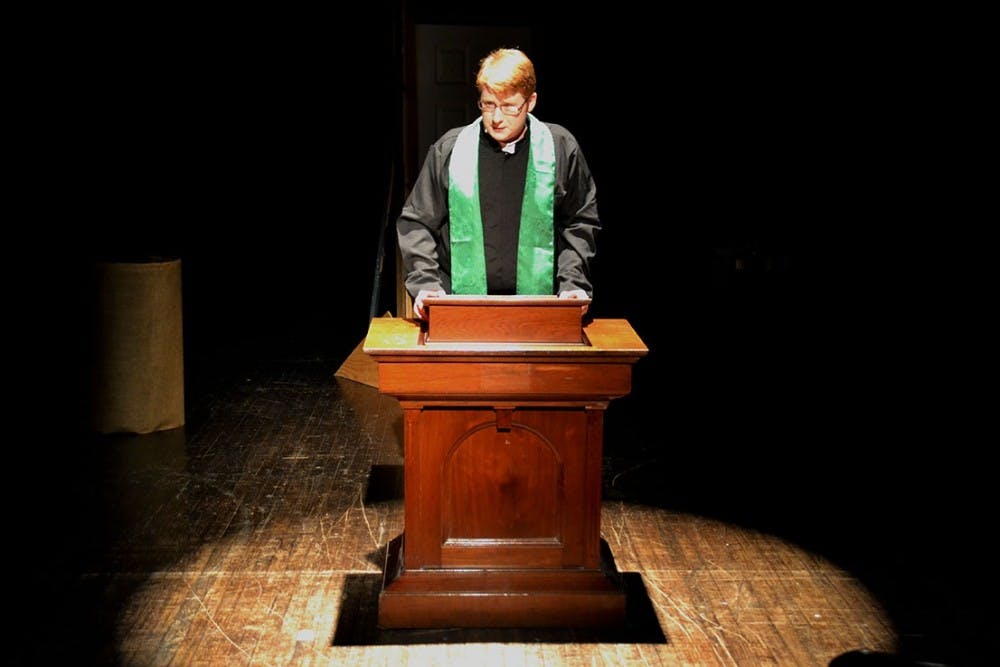“What actually happens in life is beyond interpretation,” said Father Flynn, one of the main characters in Act V’s production of “Doubt: A Parable.” “It tends to be confusing and have no clear conclusion.”
In this line, Flynn gets to the heart of the play as a whole. “Doubt: A Parable,” which ran for three nights this past weekend, is not shy about its intentions. It is not a play which tells us what is right and what is wrong. Instead, it leaves much of the analysis up to the audience, an aspect that piqued the interest of director Chris Ericson.
“I’ve always enjoyed uncertain endings in stories,” said senior Ericson, “It is very often said that the second act of ‘Doubt: A Parable’ begins as the audience leaves the theater and begins discussing their own opinions.”
Much of the first act of the play is about opposing forces, namely the fiercely strict Sister Aloysius and the affable and well-liked parish priest, Father Flynn (Aron Weibley).
Sister Aloysius, played with wonderful vigilance by Eleanor Katherine Hargrove, is an old school, conservative nun and principal of St. Nicholas Church School in the Bronx. Her strict nature leaves her respected, if not well-liked by her students, a notion which she is fine with.
The scenes which she shares with the young teacher and nun Sister James (Brianna Petitti) serve to show us just how strictly she adheres to her personal moral code. She shows little hesitation when criticizing Sister James’ teaching methods, which she calls overly enthusiastic. She even condemns her for being overly innocent, saying at one point, “innocence can only be wisdom in a world without evil.”
Father Flynn, on the other hand, is a progressive, admired priest. His well-spoken sermons, ability to lighten dark moods with clever jokes, and his penchant for long fingernails and sugar in his tea puts him in direct opposition to Sister Aloysius.
This opposition is what makes Sister Aloysius’s accusation against Father Flynn of sexual abuse such a divisive issue.
Aloysius first shares her misgivings with Sister James, who confirms some suspicious activity among Father Flynn and the school’s only black student, Donald Muller.
While Sister James is uncertain of the validity behind her accusations, Sister Aloysius could not be more certain. The remainder of the performance sees her aggressively seek out the truth behind Father Flynn’s actions with the boy, refusing to accept anything short of the full truth.
While “Doubt: A Parable” is certainly a heavy play, the biting humor throughout is quiet palpable, a notion that director Chris Ericson acknowledged even before the play began. Much of this humor comes from Sister Aloysius’ refusal to yield to any and all things progressive in nature.
Her harsh judgment of “Frosty the Snowman” had the audience in fits, only moments before she first accuses Father Flynn. This is a prime example of how “Doubt: A Parable” is able to infuse comedy in a situation in which there would appear to be none.
One of the best decisions Act V made when approaching the project was the use of a thrust stage, meaning that the stage is surrounded by the audience on three sides. This made some of the seating so close to the action that some audience members were in the spotlight. The thrust stage allowed for both a personal experience and one in which the actors were able to address and play off the audience.
Father Flynn’s two sermons, which opened the first and second half of the play, are given directly to the audience, allowing for even more immersion into the world of the play.
Both the dialogue heavy script and the fact that “Doubt: A Parable” was made into an award-winning and critically acclaimed film, starring prominent actors such as Phillip Seymour Hoffman and Meryl Streep, put a lot of pressure on the Act V actors.
While there may have been a few moments when they could have been a bit more animated and volatile in their more intense scenes, the three leads were able to enthrall the audience with their inspired performances.
4/13/2015, 11:44pm
‘Doubt’ enthralls audiences
‘Doubt: A Parable’ darkens moods and lifts heavy spirits


The Slate welcomes thoughtful discussion on all of our stories, but please keep comments civil and on-topic. Read our full guidelines here.